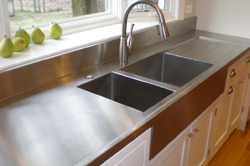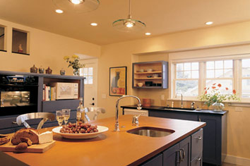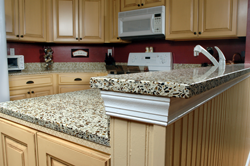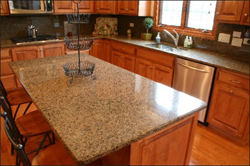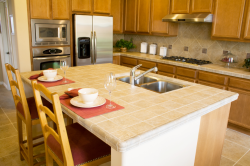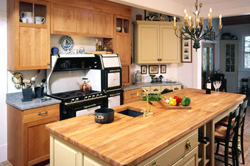Kitchen Cabinets
Bamboo

Bamboo can be a very eco-friendly choice. As we have described in the flooring section, bamboo regenerates quickly and can be harvested without damaging the root system so it can grow and be gathered again and again. One thing to keep in mind when using bamboo products is to make sure that the bamboo is being harvested correctly. It is not good to pull a crop of bamboo before it is mature and if they are waiting the correct amount of time between harvests then there is no damage to the grass. Another fun fact is that the bamboo we use for flooring and cabinets is not the same bamboo that pandas eat, so you don’t have to feel like you’re stealing their food supply. With the many variations there are with stains and grains, bamboo is a great natural alternative from hardwoods for kitchen cabinets.
Wheat Board
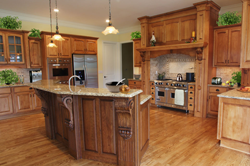
The invention of wheat or straw board has been extremely important in the construction of greener kitchens. It is made out of wheat straw, a waste by-product of the farming industry. It is used to make a fiberboard that is similar to ply board. The wheat straw fibers are mixed with a resin. The resin used is formaldehyde free and the board ends up very lightweight. This makes it easy to ship. The boards themselves are also very moisture resistant and can hold screws and nails very well. Using this in kitchen cabinets instead of normal particleboard help make a kitchen more eco-friendly as well as save literally tons of waste in our landfills.
Kitchen Countertops
Concrete
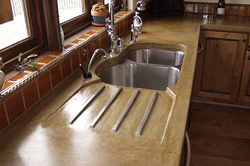
Concrete is a mix of cement, an aggregate (often sand) and water. Concrete on its own is not very green due to the energy costs incurred through shipping, but it can be made greener if it is created locally and fly ash is substituted for cement at 30-50%. There are so many different textures and colors that can be created with concrete that it is quickly becoming a popular material for kitchen countertops.
Laminate

‘Green’ laminate does exist. In order to be considered eco-friendly, a manufacturer needs to use nontoxic glues to adhere a recycled plastic sheet to a formaldehyde-free substrate. Laminates come in many colors and are the most economical of all the kitchen countertops, however, it is not very durable and can be burned. As of 2009, there is only one company that makes “green” laminate counters and a link to their site is included at the bottom of this page.

